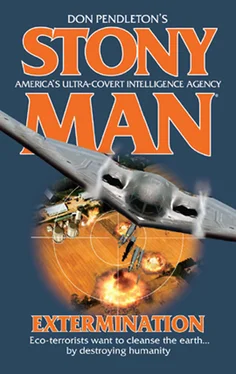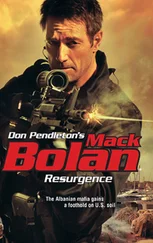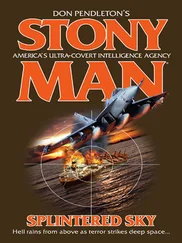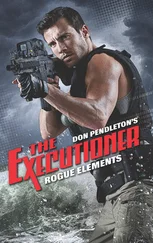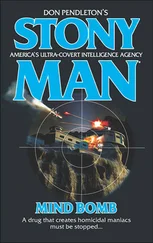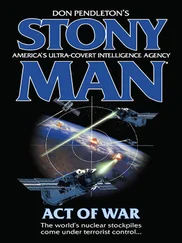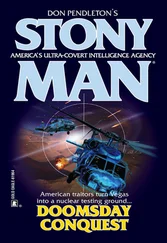The laser modules had moved on somewhere, and they had most likely gone to be stored with the bombs that they were destined to steer toward death and destruction.
Lyons knew that the trail had gone cold, and with that sudden chill came the realization that the next chance they’d have would be when fire fell from the sky upon American citizens.
The lobby was empty except for the cage where a security guard leaned back in his chair, idly watching black-and-white screens. Lyons only got a glimpse of the man as he’d passed, but the ex-cop had his senses tuned to suck in as much data as possible.
The guard was all wrong. Instead of a bored, inattentive washout with a slight roll, or an exhausted beat cop working a second job to feed his kids, this guy was fit and he was focused. He’d given Lyons the same eyeball treatment that he’d received, and his attention returned to the security screens. The gun in his holster was a customized Colt-style 1911 autopistol, carried locked and cocked in quality leather. Modern cops were the kind of people who preferred different arms, and in a city and environs like Chicago, the single-action sidearm was not approved, nor as inexpensive as the Glocks and other polymer-framed pistols that had risen in popularity. While the guy might have been SWAT, thus having the standard of training to have a police rig for the 1911, he still wasn’t in “second job” mode. No radio played in the silence of the lobby, nor did the guy wear earbuds attached to a digital music player.
The laid-back approach was faked. That level of security awareness, plus the high-profile, skill-intensive sidearm, added up to the sum that Lyons sought. This was the place he was looking for, and he strolled with renewed confidence and energy. He didn’t believe that he’d need Schwarz or Blancanales for this leg of the investigation. After all, this was only an organized crime transportation service, and while there would be a need for armed guards around the storehouse and loading docks, this was too much of a residential building to serve as either, though Lyons wouldn’t put anything past the mob. Chicago had a significant Italian-American organized community still, much like New York and New Jersey, and the Mafia had remained resilient enough to resist being put to pasture by groups who had risen to power in other major metropolises. These low-income tenements were nothing like the monolithic, soul-draining prisons like Cabrini Green, which had been demolished after they’d become cesspools controlled by powerful drug gangs.
Still, this particular tenement was big enough to prove to be a good fortress while still being low profile.
“Hey, Blondie.” The guard’s voice rose. “I gotta buzz you in. Who’re you here to see?”
Lyons was halfway to the elevators and stopped, looking over his shoulder. If this guard was as sharp as he’d assumed, there was no way that the security man would miss the arsenal he wore, no matter how loosely the leather jacket draped over it. “I’m here on business. Didn’t Scalia tell you?”
It was a bluff. Lyons had spent a few moments on the phone with Chicago’s org-crime unit, making use of his old contacts from when he was an undercover Fed, and he’d picked up a few names from the police that he could drop. Scalia was high enough that security wouldn’t want to be caught questioning his orders, but not so important that he would seem out of the loop giving such orders.
“Scalia?” the uniformed guard asked. “Don’t matter. You’re walking in here armed. I wouldn’t be surprised if you had a 25 mm turret in there.”
Lyons smirked, then pulled his lapel aside. “Nah. Just a six-inch .357 Magnum.”
“Damn, son,” the guard said. “Not far from it.”
“So what? I have to leave my heat here at the desk?” Lyons asked.
The guard shook his head. “I do have to pat you for wires, and I’d like to see your cell.”
Lyons nodded, doffing his jacket. The guard made note of Lyons’s body armor, and kept feeling. He was a professional, not minding having to mess with another man’s junk to look for concealed electronics. A signal sweep might not work in case the device had remote activation.
The guard took Lyons’s Combat PDA, the only phone he’d had with him. Luckily, the Able Team leader had switched it over to a new identity, locking off any history of calls to law enforcement, replacing it with a series of random names and numbers produced by an logarithm devised by Hermann Schwarz and Aaron “the Bear” Kurtzman to provide a clean identity. Only Lyons’s thumbprint could return the device to its normal contact list and background data. Stony Man Farm was nothing if not efficient and well-prepared when providing its members with secure communications.
“You kinda Nordic-looking to be muscle for the outfit,” the rent-a-cop said.
Lyons chuckled. “And you bleed marinara sauce?”
The guard smiled. “Welcome to the new thing. Diversity in operation.”
“My phone?” Lyons asked.
“Stays here,” the sentry returned. “Someone clones your signal and dials in, it’s like you’re wearing a mike anyway. The only phones past this lobby are landline.”
Lyons nodded. “Scalia don’t fuck around when it comes to OPSEC.”
The guard’s interest was piqued now. “Military?”
“Private contractor,” Lyons answered with just enough disappointment to let the real veteran know that he was someone who hadn’t been tolerated in a war zone by military brass, but had been in action and carried the same battle confidence that someone in the Sandbox would have.
“Well, just keep things private, Mr. Contractor,” the guard replied. “I’m not the only one here you’re gonna mess with. Two pistols and lightweight undercover Kevlar isn’t going to mean much if you do decide to get nasty.”
Lyons gave the guard a small salute, then got on the elevator. He’d have to get the CPDA back from the front desk on his way out. Hopefully, he wouldn’t have to pick it out of rubble if that was the case.
CALVIN JAMES LIKED Paris, a truly multicultural center that had accepted and nurtured some of the finest black American expatriates into global superstars on the music, writing and acting scenes. On these streets resided a history of great artists who’d come here in self-imposed exile rather than buckle under to an age of racism that did its best to snuff out their creativity simply because of the color of their skin. James often wondered how he would have dealt with those times, and knew that any chance a black doctor would have had would have been thin and as ghettoized as every other segment of American society back in those days.
James loved America; there would never be any doubt about that. He had bled for her even before he had been recruited to Phoenix Force. And part of his love stemmed from how America could heal, improve and right the wrongs of the past.
The infiltration of a country’s leadership by clever, predatory scum was not the country’s or the government’s fault. The greedy and corrupt would always find a way to positions of power, and nothing short of complete martial law and the revocation of liberty could ever quell such ambitions. As a soldier of freedom, he would never let that happen.
Here and now on the streets of Paris, the flight was not from injustice, but from those seeking to bring evildoers to justice. The target was Aasim Bezoar, a Syrian biochemist who had been traveling through Europe. Bezoar’s schooling had been in Moscow, back in the era of the Cold War, and he had been one of the top men in Syria’s chemical and biological weapons programming, helping to build an arsenal that would give Israel pause should they ever attempt reprisal for their interference in Lebanon. Bezoar’s machinations had been part of the reason for the cold peace between Syria and Israel, but they had also been part of other, more dangerous problems that had only been barely contained thanks to the efforts of law enforcement and espionage across the world.
Читать дальше
